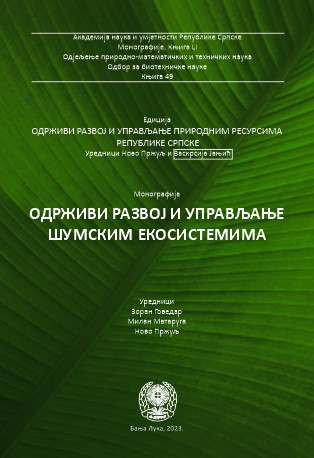Forestry and sustainable development
DOI:
https://doi.org/10.7251/EORU2305001GKeywords:
Sustainable development, forestry, certification, strategic development goalsAbstract
Global trends of increasing threat to forests and the environment, as well as the efforts of humanity to achieve greater material and economic benefits have influenced the acceptance of the concept of sustainable development and forest management. Sustainability in forestry is applied as a principle of regulated management that has long been associated with the concept of sustainability (continuity) of production, yield and income. It represents the basic principle of forest management in the Republic of Srpska in which the priority is the production (economic) function. Sustainable forest development is enabled if forests are managed in such a way as to preserve their biodiversity, productivity, natural regeneration, vitality, and their potential so that forests now and in the future perform significant ecological, economic and social functions locally, nationally and globally. level. Regarding indicators of sustainable forest management, there are differences between organizations, so there is a need to achieve widely recognized harmonization in order to facilitate the analysis and adoption of measures to improve sustainable forest management. Forestry is often viewed in the context of overall sustainable development, because the SDGs goals affirmed the economic and environmental component of sustainable development. Strategic development goals in modern European forestry are of a sectoral, social, political, economic and environmental nature. The United Nations has defined 17 basic goals of sustainable development, and almost all of them are directly and indirectly related to forestry. The global goals and measures in forestry that need to be achieved by 2030 are: stopping the trend of forest loss around the world, increasing economic, environmental and social support provided by forests, increasing the area of protected forests and strengthening cooperation and partnerships in scientific and technical forestry. Due to the mutual interaction and contradictions of goals and measures, certain compromises are needed, and due to the pronounced multifunctionality of forests and the manner of their use, the principles of certification of sustainable forest management have been promoted. The Forest Stewardship Council (FSC 1993) and Program for the Endorsement of Forest Certification (PEFC 1999) are mainly applied. In the Republic of Srpska, the FSC FM certificate has been held by JPŠ "Šume Republike Srpske" a.d. since 2008. Sokolac, while private forests are not certified. In the Republika Srpska/BiH, FSC standards for sustainable forest management have been developed, which have been used since March 22, 2020. years (FSC 2019) and have a validity period of five years. The evaluation of the functions of our forests is not always in line with modern trends in the evaluation of forest resources, because the indicators related to productivity from the point of view of raw material base, growth and simple reproduction are quantified. Forestry development guidelines must be strategically focused on priority areas: forest cultivation and protection, development of a sustainable environment, development of human resources and education systems, and business use of information and communication technology. Necessary coherence, complementarity and integration of sustainable development goals have influenced the inclusion of forestry as an important economic activity for achieving human health, access to renewable energy, food, drinking water, the fight against climate change and others. Contemporary intentions that are insisted on when it comes to the importance of forest ecosystems, and current topics in the process of education, forestry science and profession relate to ecosystem services and biodiversity, forest protection, biomass production for energy, new technologies, information systems and monitoring.
